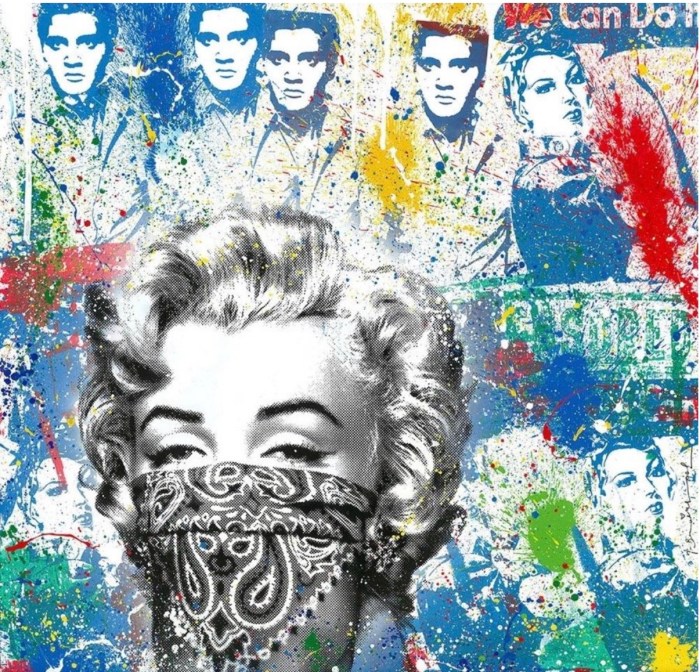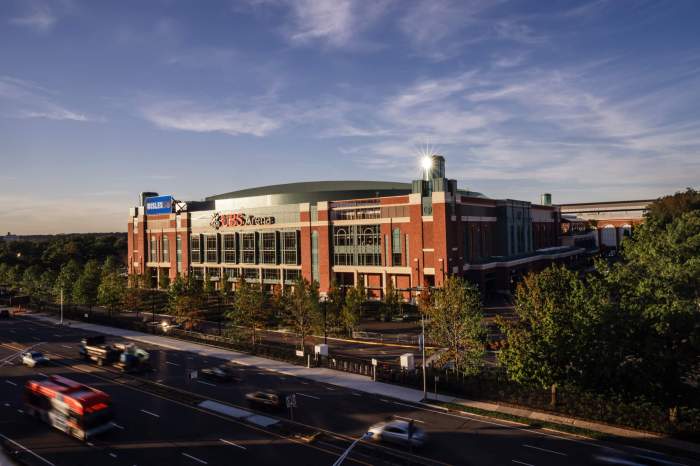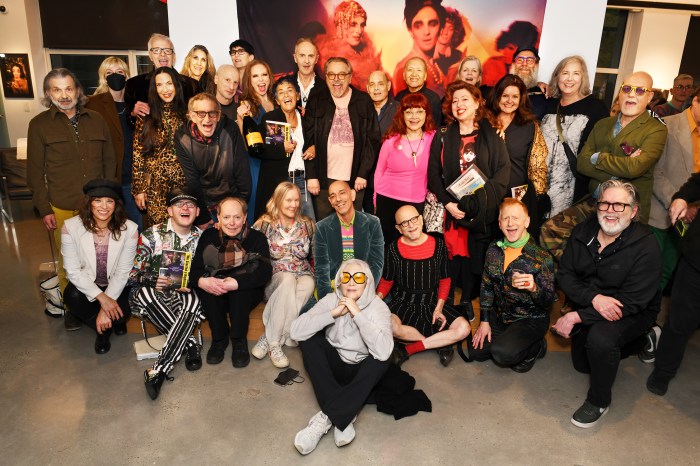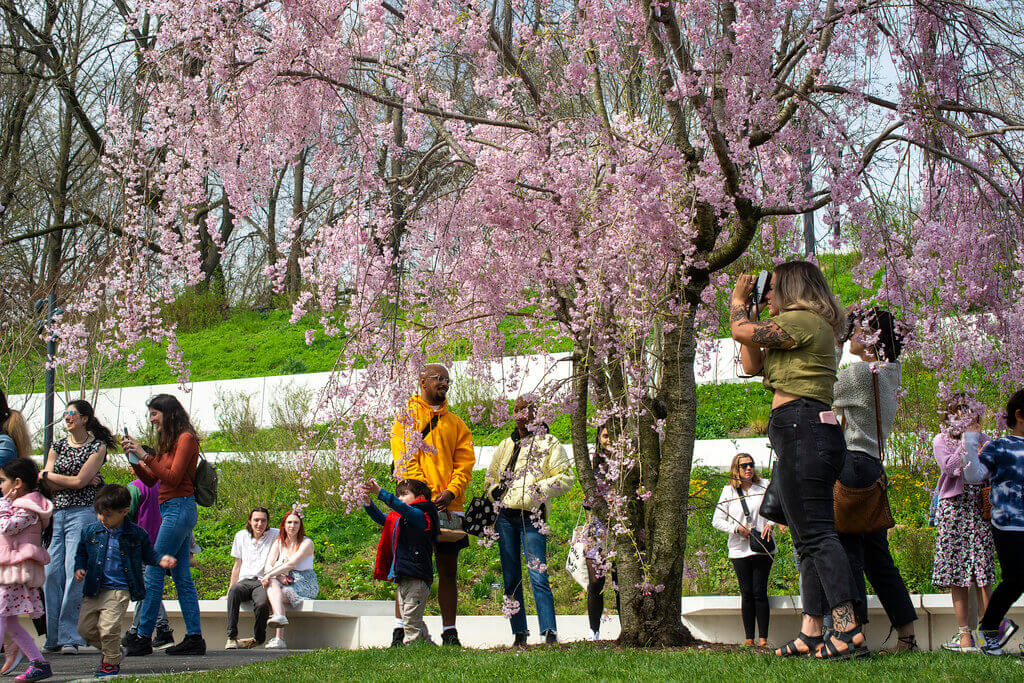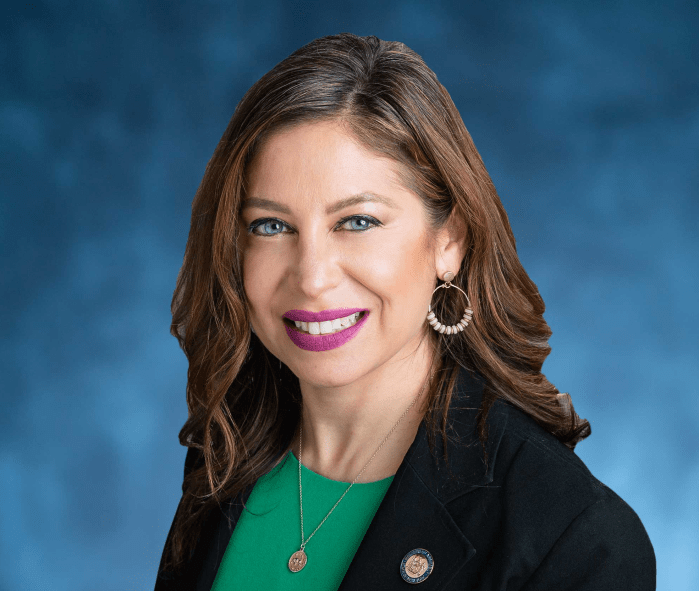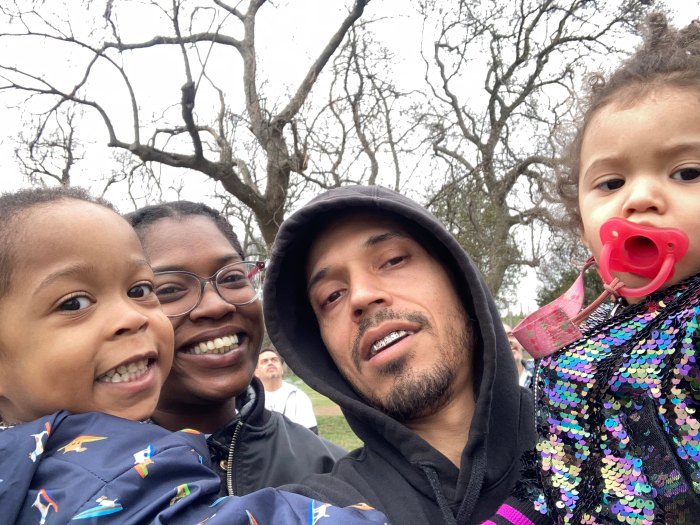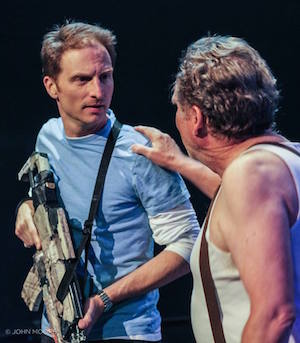
BY DAVID KENNERLEY | The New York International Fringe Festival (FringeNYC), now two decades old, is notorious for being a fount of frivolity. A quick perusal of this year’s nearly 200 offerings confirms this: “Naked Brazilian,” “Humorously Horrendous Haunted Hideaway,” and “A Microwaved Burrito Filled with E. coli.”
But over the years, FringeNYC has developed a taste for the topical, staging edgy shows seemingly ripped from the headlines. Soon after the economic meltdown in 2008, there were plays featuring greedy Wall Streeters. A few years ago, there was a profusion of marriage equality plays, and last year it was transgender issues.
This is the year of blacks, whites, cops, and guns. And more guns.
Not that anyone should be surprised; the nimble Fringe is expert at tackling current issues well ahead of mainstream theater. John Moore, author of “Waiting for Obama,” a biting dramedy about a Colorado family convinced the president is coming for their guns, asserts that the Fringe fosters a different kind of creative process where artists can explore what is happening in the moment, go with it, and have it presented much more rapidly.
“In the mainstream theater [world], it typically takes even a sure-fire new play at least two years to get read, liked, scheduled, developed, and finally staged,” he said. “As a result, live theater can often seem, well, two years behind the times.” There are only six months between submission and staging at FringeNYC, he explained.
Moore is outraged that in such a brief period, the issue of gun violence in America has grown only more numbingly topical.
“I keep hoping I’m done keeping my script up to date, but the insane fucking daily headlines keep sending me back to the keyboard to somehow incorporate the latest mass fucking tragedy,” he said.
The devastating loss of lives at the hands of deranged gunmen has been covered extensively in the media. What does his piece add to the conversation?
“None of those ongoing gun sprees is changing minds on the gun issue,” Moore said. “And if Sandy Hook didn’t change people’s minds on little issues like background checks, then why even talk about it at all? But I say if we can’t talk about these polarizing issues in our own living rooms for fear of a fight breaking out, then we must talk about them in a theater. That’s why theater exists.”
As a lifelong journalist, it would have been easy for Moore to churn out a data-heavy polemic on the gun issue. But he was also the Denver Post theater critic for more than a decade and knows how to engage audiences.
“No one gives a damn about statistics in a theater,” he said. “You have to make it real.”
Moore keeps it real in his play by portraying both sides of the issue in fresh ways. The protagonist is not a gun control advocate, but a Christian conservative who is a staunch defender of the Second Amendment. He’s the one waiting for Obama (any echoes of “Waiting for Godot” are purely intentional).
“I was not interested in writing a one-sided screed,” he said. “I wanted a fair fight.”
The Theater at the 14th Street Y (344 E. 14th St., at First Ave.); Fri., Aug. 12, 5pm; Sat. Aug. 13, 2pm; Sat., Aug. 13, 9:15pm; Sun., Aug. 14, 8:30pm; Mon., Aug. 15, 6:45pm.
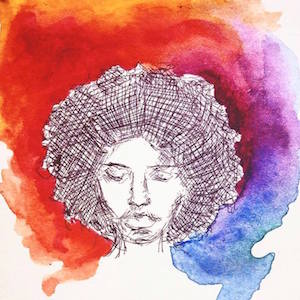
Tony Jenkins, author of “Black Magic,” a drama based on spoken word poetry that explores the lives and souls of seven slain black men, is grateful for theater fests like FringeNYC.
“I believe that the Fringe accepts and supports work that otherwise wouldn’t be funded,” he said. “It’s easy to get behind a tried and tested family musical and totally disregard another race play. Another controversial play. A play with queer people or a play that redistributes power from the majority. A play we assume won’t make any money in the mainstream.”
As an openly gay playwright of color, Jenkins’ work has a highly distinctive bent rarely seen in theater, mainstream or otherwise.
“This play gives space for the voices that we never hear,” he explained. “These black men, after their deaths, are defined and criticized and picked apart by the news cycle and are never able to tell their own stories. Corpses aren’t available for comment.”
According to Jenkins, infusing queer themes into his work is “almost inescapable.” In “Black Magic,” two of the characters are gay, which adds a potent dimension to the Black Lives Matter movement.
“There was no way to travel to the world of this play without encountering some black men who happened to be gay,” Jenkins said, adding that the first scene he wrote was explicitly queer by accident. “I found myself writing about a different kind of black love. These stories of dead gay black men felt even more silenced and more difficult to unearth. There is an epidemic of homophobia in the black community that remains mostly unchallenged. It is a subtle and destructive force. I am attempting to fight back.”
The play wrestles with themes of forgiveness, sacrifice, loss of innocence, love, coming of age, self-discovery, reclamation, and equality. Yet Jenkins contends that the work is also a tribute to black love.
“Black men loving black men, specifically and fiercely. The brotherhood. I don’t think we hear nearly enough about that,” he said.
What does Jenkins hope audience members take away from “Black Magic?”
“The play argues that black lives are remarkable,” he said. “That violence in the world is not the solution that lasts. That we are more connected than we allow ourselves to be. That sometimes we are the ones holding the gun. The play argues that love is the way. The play looks the audience in the eye and dares them to say otherwise.”
SoHo Playhouse (15 Vandam St., btw. Sixth Ave. & Varick St.); Fri., Aug. 12, 5pm; Mon., Aug. 15, 2pm; Wed., Aug. 17, 7pm; Fri., Aug. 19, 7:15pm; Sat., Aug. 20, 5:45pm.
With “Machine Gun America,” Joseph Huff-Hannon has taken a sharply different tack, crafting a scathing satire about the rise of gun violence in America. And it’s a campy, over-the-top, full-throated musical. Like most brilliant theater, the genesis of the piece was purely by chance.
“About a year-and-a-half ago, I was deeply struck by a bizarre and tragic news story out of Idaho,” he said. “A two-year-old shot his mother, with her own handgun, in an aisle of the Walmart shortly after Christmas. The gun was kept in a special pocket in her purse especially fitted for firearms — a Christmas present from her husband that year.”
Huff-Hannon was motivated to learn more. He found dozens of examples of parents and siblings being killed or maimed, and of kids shooting themselves. He discovered that last year more Americans were murdered by armed toddlers than terrorists.
“This is patently insane,” he said. “No other major nation has this kind of problem. But it’s also an inevitable byproduct of a country with more guns than citizens.”
According to Huff-Hannon, there are plenty of documentaries and news exposés about America’s gun violence epidemic, but there’s very little in the popular culture, especially in theater.
“There’s nothing that really explores the powerful mythos around gun ownership or the reasons that gun owners run one of the strongest lobbying groups in the US,” he said. “So the play came out of that, building up a bizarre reality on the stage, with original upbeat songs and tragicomic characters, with a very traditional boy-meets-girl plot arc that’s only one step removed from the national tragicomedy we already live in.”
“Machine Gun America” gets its title from a theme park of the same name in Florida that bills itself as a “fully automatic adrenaline attraction.”
Appallingly, it’s a place where families (kids as young as 10 are allowed on premises) can learn to shoot firearms at fake zombies or terrorists, and it’s only a few minutes from the Pulse nightclub, where earlier this summer 49 young LGBT people were massacred in the deadliest mass shooting in modern US history.
“After the horrific Orlando killings, I didn’t see any news coverage noting the proximity of these two places, but that doesn’t particularly surprise me,” Huff-Hannon said. “There’s a lot of public hand-wringing about gun violence, but in this country we have more gun stores than Starbucks and grocery stores combined. And I think that shows us what our consumer priorities are as a nation. When we glorify weapons that can kill a massive amount of people in a short amount of time and make them available for sale almost everywhere, we can’t be surprised when people actually use those guns for what they’re intended to be used for.”
After the Orlando bloodbath, a sign appeared at the entrance of the grisly gun center that offered free shooting lessons so visitors could have the “ammunition they need to fight back.”
“I seriously doubt the LGBTQ community in Florida has flocked to Machine Gun America to take them up on the offer,” he said.
As an out playwright (in fact, virtually the entire creative team of “Machine Gun America” happens to be gay), this outrageous juxtaposition cuts particularly close to the bone. Huff-Hannon is enthused that the queer community is taking a leadership position in the fight for sensible gun control, with new groups like Gays Against Guns organizing disruptive, ACT UP-style protests.
Flamboyan Theater at The Clemente (107 Suffolk St., btw. Rivington & Delancey Sts.); Sat., Aug. 13, 7:15pm; Mon., Aug. 15, 9:45pm; Mon., Aug. 22, 4:30pm; Wed., Aug. 24, 4:45pm; Sat., Aug. 27, 2pm.
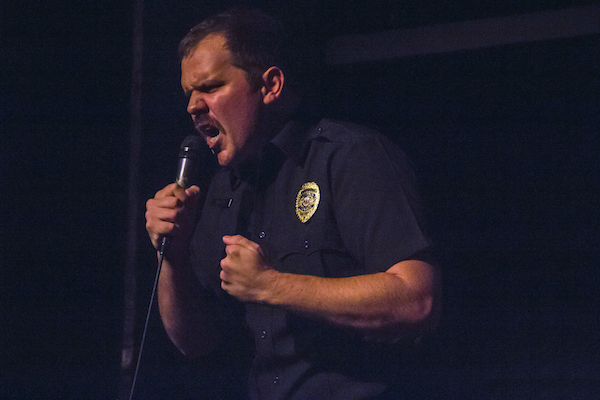
To be sure, there are scads of other provocative shows about race, cops, and guns at the Fringe. You may also want to check out “Black & Blue,” “Not All Cops Are Bad,” “Colorblind’d,” “Night of the Living N-Word!!,” “My White Wife, or So I Married a Black Man,” and “Mother Emanuel” (about the tragic 2015 shooting at Mother Emanuel African Methodist Episcopal Church in Charleston).
The New York International Fringe Festival runs through Aug. 28 at various downtown venues. For tickets ($18), visit fringenyc.org.










